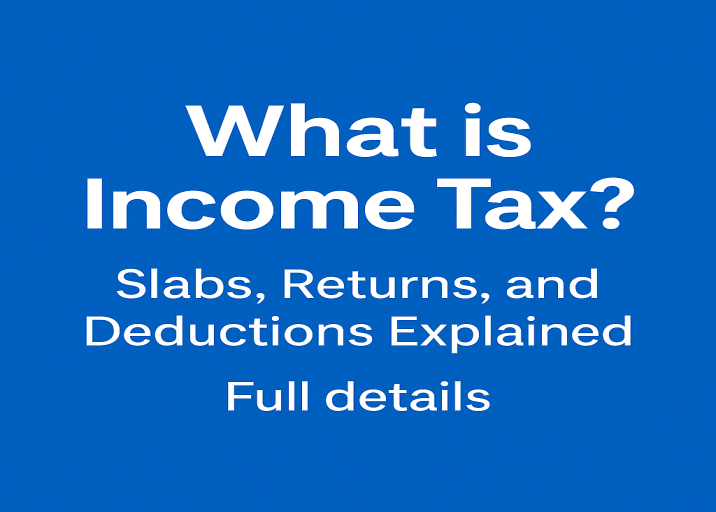What is Income Tax? Slabs, Returns, and Deductions Explained, Full details 2025 updated
What is Income Tax? Slabs, Returns, and Deductions Explained, Full details 2025 updated
What is Income Tax?
Income tax is a direct tax imposed by the Government of India on an individual’s or entity’s income. It is one of the primary sources of revenue for the government and is used to fund public services, infrastructure, defense, and welfare programs.
If you earn income in India, whether from salary, business, investments, or other sources, you may be liable to pay income tax as per the applicable tax laws.
Table of Contents
How Income Tax Works
The amount of tax you pay depends on:
- Your total taxable income in a financial year
- Your age (different slabs for senior citizens)
- The tax regime you choose (Old vs. New regime)
- Applicable deductions and exemptions
Every individual and business must calculate their income, apply the relevant tax rates, and pay the due amount before the deadline.
Income Tax Slabs in India (FY 2024-25)
In India, income tax is charged in slabs, which means your income is divided into parts, and each part is taxed at a different rate.
New Tax Regime (Default from FY 2024-25)
| Annual Income Range | Tax Rate |
|---|---|
| Up to ₹3,00,000 | Nil |
| ₹3,00,001 – ₹6,00,000 | 5% |
| ₹6,00,001 – ₹9,00,000 | 10% |
| ₹9,00,001 – ₹12,00,000 | 15% |
| ₹12,00,001 – ₹15,00,000 | 20% |
| Above ₹15,00,000 | 30% |
Rebate under Section 87A: Individuals with taxable income up to ₹7,00,000 under the new regime pay zero tax after rebate.
Old Tax Regime
The old regime has higher tax rates but allows more deductions and exemptions, such as HRA, LTA, and Section 80C benefits.
Filing Income Tax Returns (ITR)
An Income Tax Return (ITR) is a form where you share details of your earnings, tax-saving deductions, and the taxes you’ve already paid with the government. Filing is mandatory if your income exceeds the basic exemption limit.
Steps to file ITR:
- Collect your income documents (Form 16, bank statements, investment proofs).
- Pick the right ITR form according to how you earn your income.
- Calculate your total taxable income.
- Pay any pending taxes.
- File online through the Income Tax e-Filing portal.
- Verify your ITR (via Aadhaar OTP, net banking, or sending a signed form).
Deductions and Exemptions
The Income Tax Act provides several deductions to reduce taxable income, especially under the old regime.
Common deductions:
- Section 80C – Up to ₹1.5 lakh for investments in PPF, ELSS, life insurance, etc.
- Section 80D – Medical insurance premiums (up to ₹25,000 for self/family, ₹50,000 for senior citizens).
- Section 24(b) – Interest on home loan (up to ₹2 lakh/year).
- Section 80E – Interest on education loans.
- Section 80G – Donations to charitable institutions.
Penalties for Non-Compliance
Failing to file or pay your income tax on time can lead to:
- Late filing fees (up to ₹5,000)
- Interest on unpaid taxes
- Possible legal action for severe defaults
Key Takeaways
- Income tax is a mandatory contribution based on your earnings.
- India has two regimes – choose the one that benefits you most.
- Filing ITR on time helps avoid penalties and ensures smooth financial record-keeping.
- Make full use of deductions to lower your tax burden.
Learn more about Finance
![]()




